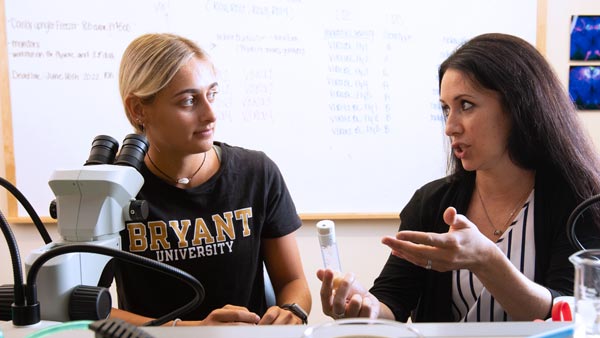Taryn Rauff’s love for nature sprouted from a young age. As a child back home in Johannesburg, South Africa, Rauff ’22 would grab her microscope and go outside in search of specimens. Bugs and animals fascinated her so much she’d create research books of the South African wildlife.
“I kind of made my own encyclopedias about them, so research has always been something I’ve been fond of,” says Rauff, smiling at the memory.
Rauff graduated from Bryant with a Biology Research Intensive Concentration and minors in Psychology and Human Resource Management. Currently, she works as a research associate for Professor of Biological and Biomedical Sciences Christopher Reid, Ph.D. Rauff will pursue the university’s Master of Business Administration this upcoming fall and continue playing on the Bryant’s field hockey team, which she has been part of since her freshman year. Following graduate school, Rauff plans to pursue a Ph.D. in either pathology or pathobiology.
Research road
Conducting experiments, teaching a weekly biology lab, keeping the lab clean, and producing research presentations are the main tasks that dot Rauff’s schedule as a research associate. She says the university has provided her with hands-on experiences that allow her to implement the theories she learned in the classroom.
Alongside five undergraduate students, Rauff is contributing to research led by Reid, who developed an antibiotic that disrupts a bacteria’s ability to divide and spread throughout its host by inhibiting a gene in the cell wall. Her task is to conduct experiments focused on antibiotic resistance in bacteria.
“Doing this type of work is very important, especially if you want to go into research as an academic career,” Rauff says.
Rauff is not new to the research world. As an undergraduate, she participated in Bryant’s Summer Undergraduate Research Fellowship (SURF), which offers paid research positions for undergraduates to work on real projects. Through SURF, she worked with Assistant Professor of Psychology Kristin Scaplen, Ph.D., in a neuroscience lab. Together, they looked at alcohol intoxication in fruit flies and how the substance affected the flies’ behavior and neurons. Rauff explains that fruit flies and humans have similar neural pathways, and their findings could help researchers understand alcohol abuse.

Building her future
In addition to her work in the lab, Rauff has gone on to present at half a dozen conferences, including the Boston Area Drosophila Conference, International Society for Neuroscience, and National IDeA Symposium of Biomedical Research Excellence. She has also won awards at the NEURON Conference for her research on alcohol reward circuitry and the exploration of connectivity patterns within mushroom body output neurons in fruit flies.
“Bryant emphasizes presentation skills and that's helped me build my confidence. I don’t think I would have been able to do that [present at conferences] if I hadn’t been so exposed to it in class,” Rauff says. “I’ve also realized I really like presenting in front of people.”
She adds that presentation skills are particularly important in scientific research. When individuals conduct experiments and make new discoveries, they need to be able to share their findings with the science community.
Rauff credits her academic success to forming relationships with her Biological and Biomedical Sciences professors, which led her to research opportunities that furthered her understanding of biology and its various sectors.
“One thing that stands out to me about Bryant is how small it is. I like that the classes are small and concentrated, so you have more one-on-one time with your professors,” Rauff says. “I don't think I would have had as many opportunities in another school.”